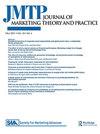设计美学在功利主义和享乐主义服务中占主导地位:“美即善”和“尤利西斯”效应
IF 5.3
Q2 BUSINESS
引用次数: 2
摘要
本研究首次利用二次效应来探讨设计美学在什么情况下可以产生相反的效果。它通过引入“尤利西斯”效应(新引入的效应)来补充“美丽的东西就是好的”效应。手机银行和手机游戏分别被选为主要是功利和主要是享乐的服务。使用在线问卷,在法国收集数据。使用SmartPLS。结果表明,在功利主义占主导地位的服务中,设计美学与意图之间的关系呈倒u型曲线。然而,在一个以享乐为主导的服务环境中,设计美学和意图之间的关系是线性上升的。本文章由计算机程序翻译,如有差异,请以英文原文为准。
Design aesthetics in predominantly-utilitarian versus predominantly-hedonic services: the “what is beautiful is good” and “Ulysses” effects
ABSTRACT This study is the first that uses quadratic effects to explore when design aesthetics can generate the opposite effect. It complements the “what is beautiful is good” effect by introducing the “Ulysses” effect (newly introduced effect). Mobile banking and mobile gaming are selected as predominantly-utilitarian and predominantly-hedonic services, respectively. Using online questionnaires, data are collected in France. SmartPLS is used. The results show that, in a predominantly-utilitarian service, the relationship between design aesthetics and intention is an inverted U-shaped curve. However, in a predominantly-hedonic service context, the relationship between design aesthetics and intention is rather linear ascending.
求助全文
通过发布文献求助,成功后即可免费获取论文全文。
去求助
来源期刊

Journal of Marketing Theory and Practice
BUSINESS-
CiteScore
6.80
自引率
6.70%
发文量
37
期刊介绍:
The Journal of Marketing Theory & Practice is devoted to the publication of peer-reviewed articles addressing substantive, managerial issues in marketing. In the context of developing, enhancing, and disseminating marketing knowledge, JMTP publishes both conceptual and empirical work, so long as the work provides strong implications for the managerial practice of marketing. Unlike other marketing journals that may be more focused on specific methodological approaches, deal with theoretical issues without regard to application, or represent various subfields of marketing, JMTP is positioned as a general marketing journal affording a quality outlet for more managerially-oriented research across the scope of the field.
 求助内容:
求助内容: 应助结果提醒方式:
应助结果提醒方式:


